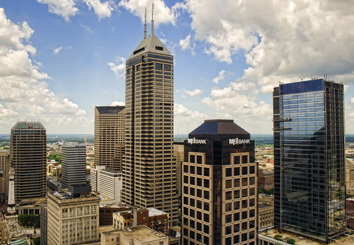Subscriber Benefit
As a subscriber you can listen to articles at work, in the car, or while you work out. Subscribe NowThe City-County Council’s approval last week of a new taxing district to raise funds for downtown cleanliness, public safety and homelessness initiatives is setting into motion the selection of a new city-state board to decide precisely how the revenue will spent.
Five appointing entities at both the state and local levels are charged with selecting the nine-member board, which will decide how up to $5.5 million raised from certain downtown property owners will be spent each year.
Downtown Indy Inc. and other stakeholders have said it’s important the board be assembled by Nov. 1 to present a budget to the City-County Council. That would give the city enough time to incorporate the taxing district’s spending plan into the city’s overall budget in time for it to be submitted to the state by the Nov. 8 deadline.
While an earlier state legislative proposal gave the state and city equal representation on an eight-member taxing district board, the final law set the stage for a nine-member board with six state-appointed members and three appointed by the city.

The Indianapolis mayor will have one appointment, while the City-County Council will appoint two members.
At the state level, the Indiana governor will have four appointments. The Indiana House speaker and Senate president pro tempore each are granted one appointment.
The Republican-dominated Legislature created the framework for Democratic-led Indianapolis to establish the taxing district, which will charge certain property owners 0.17% of their property’s gross assessed value. Apartments and single-family residences will be exempt from the fee, while office space owners and hoteliers will provide the bulk of the revenue.
While state and city government have clashed on many partisan issues in recent years, several people expressed hope that a common goal of maintaining and improving downtown will tamp down any partisan differences.
State Rep. Blake Johnson, a Democrat representing downtown, said he would have preferred more local control. Still, he said the compromise was necessary to keep the tool and what matters is how well the members work together.
“If it’s almost on the same page and working for a better downtown, that’s all good with me,” Johnson told IBJ.
The taxing district board is expected to operate like a combination of the Capital Improvement Board—a state-local board that oversees the Indiana Convention Center and related properties—and neighborhood economic improvement district boards.
Andy Mallon, executive director of the Capital Improvement Board, said he expects that the taxing district board will give downtown Indianapolis the buy-in and support that it “absolutely needs” from its most important stakeholders.
“That has been our experience at the CIB, is that when the stakeholders are involved and all working towards the same mission, you get really good ideas from people that are directly affected by the decisions we make and the facilities we own and operate,” he said.
The Indy Chamber is assisting in the process of creating the board mainly by providing the appointing entities with the names of potential candidates. Over the 18-month period that the chamber has been doing outreach regarding the taxing district, certain individuals and property owners have been deeply involved in the process.
“Those people have already sort of auditioned and put their names in the hat,” said Taylor Hughes, the Indy Chamber’s chief of staff.
State law requires that at least five of taxing district board’s nine members own property within the district, which is roughly the Mile Square and a little beyond. Hughes said that requirement should help dilute any potential partisan divide.
Downtown Indy Inc., the not-for-profit that manages downtown public spaces, will provide staff to support the operations of the taxing district board. It worked with the Indy Chamber to help craft the state legislation for the taxing district. the framework that landed in the state budget last year. Under state statute, the latter will provide staff to support the operations of the board.
One appointment so far
So far, just one member has been named to the taxing district board. Indiana Senate President Pro Tempore Rodric Bray, R-Martinsville, has made his pick with Sen. Kyle Walker, R-Indianapolis. Walker worked on the initial tax legislation in the waning hours of the 2023 session. A spokesperson for his office declined an interview request related to his appointment to the board.
Indiana Gov. Eric Holcomb has not yet made his selections. Erin Murphy, a spokeswoman for his office, told IBJ that names of the governor’s appointees will be released once all four spots have been filled.
Mayor Joe Hogsett and Indianapolis City-County Council also have not selected their picks.
Emily Kaufmann, a spokeswoman for the Indianapolis Mayor’s Office, said in a statement that Hogsett “looks forward to meeting with residents” for his appointment to the board.
“He is looking to select a resident whose vision for downtown Indianapolis aligns with the ongoing efforts of public safety, cleanliness, and homelessness,” the statement read.
Please enable JavaScript to view this content.


I am hoping that the budget will have a portion for making Downtown Indy and its many attractions and venues affordable for all Hoosiers, not just the wealthy and investors and their pals.Perhaps some days or events which are sponsored by the businesses in the area, which give out free tickets with parking, like various companies did for the Indianapolis Indians. On those freeticket nights, the stands would be filled with loud and happy crowds.
I am very tired of paying the 9% restaurant tax to support teams and business that are too expensive for us to enjoy.
Let’s make Downtown a true Hoosier city where which everyone can enjoy —
and be proud of.
Hope the GOP members do not continue to seek to damage Indy with poison pill policies.
This is what I’m most concerned about. Republicans have not demonstrated a good-faith effort through any legislation that affects Indianapolis, I don’t anticipate them changing their tune.